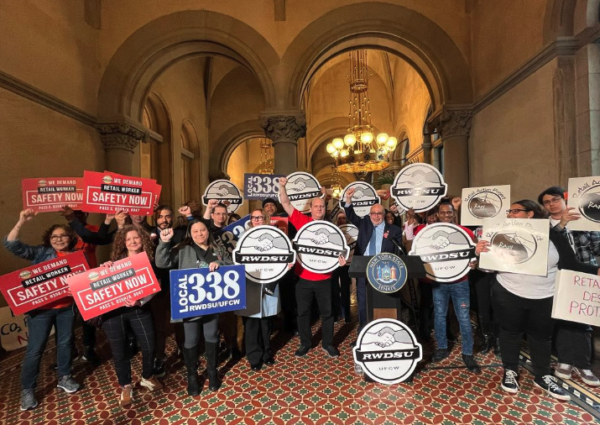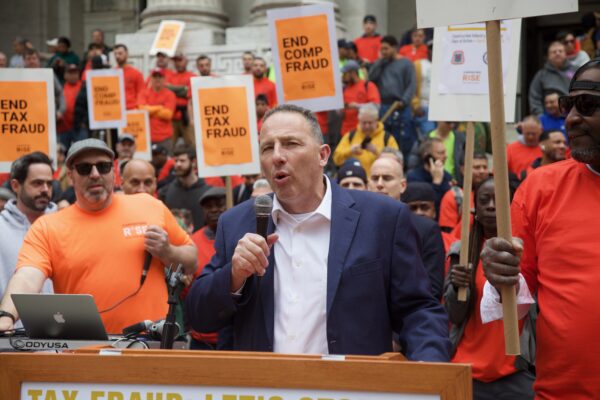March 4, 2013
By Steven Wishnia
Navigating a health-care landscape transformed by Obamacare was the theme of LaborPress’ health-care summit Feb. 27. The almost 250 people who turned out at the District Council of Carpenters’ Manhattan headquarters discussed how the Affordable Care Act is affecting health-care delivery and insurance plans, while some strategized to supersede it with a single-payer system.
Keynote speaker Thomas Buffenbarger, president of the International Association of Machin ists and Aerospace Workers, noted that his union had opposed the ACA—and that, unfortunately, the problems it predicted have come to pass. The 30% tax the law will impose on so-called “Cadillac plans” beginning in 2018, he said, is more than the $2,000 fine for employers who don’t provide health insurance, so major aerospace companies such as Boeing and Lockheed Martin are threatening to slash health benefits in the next round of contract talks.
ists and Aerospace Workers, noted that his union had opposed the ACA—and that, unfortunately, the problems it predicted have come to pass. The 30% tax the law will impose on so-called “Cadillac plans” beginning in 2018, he said, is more than the $2,000 fine for employers who don’t provide health insurance, so major aerospace companies such as Boeing and Lockheed Martin are threatening to slash health benefits in the next round of contract talks.
In January, he added, when Boeing workers in the Puget Sound area approved a controversial contract extension that froze future pensions, they weren’t just voting to keep jobs there—they were also voting to preserve current retirees’ health-care plan.
In the two panels on adjusting to the ACA, mostly insurance-company executives, a rough consensus emerged. The 
With 20 different plans available on New York’s exchange, the ACA has spurred competition that is bringing premiums down, said Michael Jordan of Magnacare. On the other hand, said Emblem Health vice president Jerry Gallo, that means insurers are going to have to “drive profitability” by lowering costs. Likely ways they’ll do this include “wellness” programs to reduce people’s use of medical care, increasing out-of-pocket costs for patients, and narrowing the networks of physicians and providers they will pay for. In New Hampshire, only 10 of the state’s 17 hospitals are in-network for the plans available on its exchange; Empire vice president Tom Canty defended that as “a reasonable cost measure.”
“Nothing in this law addresses costs,” said Magnacare president Joseph Berardo. He ripped a proposed state law that would force insurance companies to pay for out-of-network care, and said unions and consumers will have to choose between “choice” and “integrated care.”
The focus was very different at the “Winning Better Health Care” discussion, which featured Assembly Health Committee chair Richard Gottfried, sponsor of a bill to set up a single-payer system in New York State. Even with all the fixes, he said, “the ACA really cannot work,” so instead of having costs shifted to patients by “regressive” premiums and copays, health care should become a public service like schools or police.
Arthur Cheliotes, president of Communications Workers of America Local 1180, seconded that, saying that the “broken” political system enables monopolies to focus on profits instead of healing. Dr. Oliver Fein of Physicians for a National Health Program said that if administrative costs were reduced from the 20-30% of private insurance to the 3% of Medicare, “we could guarantee coverage for everyone uninsured.”
Labor should “stop thinking of the ACA as the enemy,” said Mitra Behroozi, head of Local 1199 SEIU’s benefit and pension funds, because the real problem is the high cost of health care. Though a single-payer system would be better, she explained, the law will bring costs down and get more people into coverage.Narrow networks may not be popular, she added, but they drive people to the most cost-effective coverage.
The odds of single-payer getting through the current Congress or state Senate, however, are slim to none. To win, said Mark Dudzic of the Labor Campaign for Single-Payer, labor needs a “movement against corporate power” and to move the idea “from an ideological position to a human-being position.”



